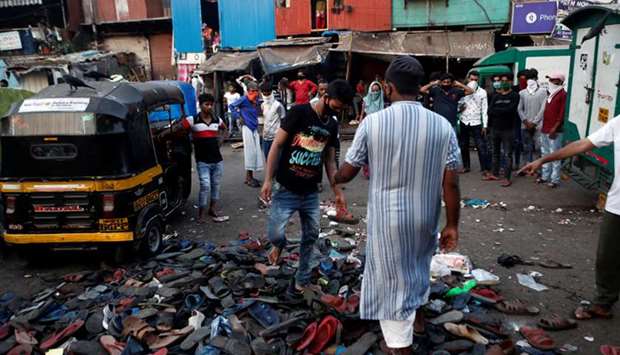Thousands of migrant workers and slum poor in Mumbai defied stay-at-home orders yesterday to protest the extension of the country’s coronavirus lockdown.
Footage on news channels showed huge crowds gathered near the Bandra railway station in the late afternoon, jostling each other and violating social distancing norms, resulting in a dangerous situation in Mumbai, a city with the highest number of Covid-19 cases in India.
The police, which issued several warnings, had to resort to caning to disperse the crowds.
The workers, made jobless by the lockdown, were demanding they be sent back to their homes.
The crowds also comprised poor from nearby slums who came in search of food, witnesses said.
By 6pm, police spokesman Pranaya Ashok said “the crowd had dispersed” adding the “situation is under control, and the entire area will be sanitised” as a precautionary measure.
The gathering took place close to ‘Matoshri’, the private residence of Chief Minister Uddhav Thackeray.
Several of the migrants said they could not continue to live in Mumbai, away from their homes or families in different parts of India after the lockdown was extended till May 3 by Prime Minister Narendra Modi.
They asked the police to make arrangements for them to travel back to their respective towns and villages.
Congress legislator Zeeshan Siddique tried to calm them down, appealed to them to disperse and promised to take up their issue.
“The current situation is the result of the federal government not being able to take a call on arranging a way back home for migrant labour,” Aaditya Thackeray, leader of Maharashtra’s ruling Shiv Sena party, and state tourism minister, said on Twitter.
“They don’t want food or shelter, they want to go back home.”
Former Mumbai Congress president Sanjay Nirupam said: “This was bound to happen. People have no food to eat, they are prevented from returning to their native villages. For how long can they remain like this? The government’s figures are merely on paper. For how long and to how many people can any government keep feeding freely? Is there no alternative?”
Congress spokesman Sachin Sawant said if the prime minister had given time to the migrants to return home, they would not have protested on the streets of Mumbai, Delhi, Surat and other places.
“The state government can provide them food, but cannot send them to their homes in view of the lockdown,” Sawant said.
A leader of the Trade Unions Joint Action Committee, Vishwas Utagi, said there were over 2mn migrants stuck in Mumbai since the March 25 lockdown, besides 3,000 fishermen stranded at Gholvad in south Gujarat.
“They have no food, no work, no homes, no transport to go home. How can they survive? The government machinery is not responding to the challenge and this is a human tragedy in other parts of the country as well,” Utagi said.
Leaders from the Bharatiya Janata Party (BJP) that rules at the federal level instead accused state authorities of laxity in providing food rations to the workers.
BJP MP Poonam Mahajan said it was the responsibility of the state government to make separate plans for the migrants, which it had failed to do resulting in yesterday’s chaos.
BJP state vice-president Kirit Somaiya asked the government how the crowd was allowed to flout lockdown norms.
“It’s a matter of deep concern. What about intelligence, and why today? The state government must treat this incident seriously and modify its schemes to provide food to the migrants,” Somaiya said.
Earlier yesterday, Modi announced the extension of the lockdown until May 3, but said he would consider relaxing restrictions in parts of the country after a week considering the hardships faced by the poor.
The lockdown that began on March 25, has hit millions of poor and those in rural areas at a time when the Indian economy is struggling.
Migrant workers, mostly daily wage earners, who lost their jobs and incomes have been the worst hit.
Similar scenes were witnessed in New Delhi last month after desperate workers crowded bus terminals days after the lockdown was announced.
Hundreds of thousands of workers had then made long and dangerous journeys home amid fears they could carry the virus to remote areas in the country.

A man walks on scattered footwear after a large crowd of migrants were forced to disperse by police after they gathered outside a railway station in Mumbai yesterday.
